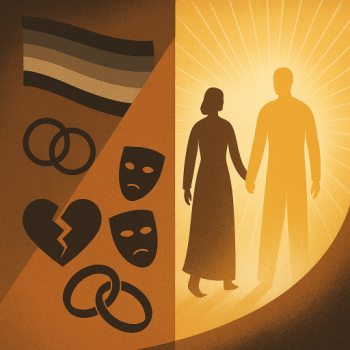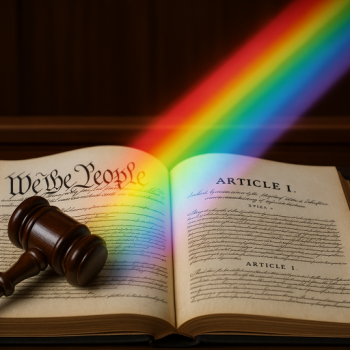Allow me to introduce you to the Episcopal Church.
I jest in the title of this article. All people, regardless of background, I desire join the Catholic Church. I do not wish any to leave Christ’s Church. My jest highlights my concern for dissenting or heterodox Catholics who I believe are more theologically in the line with the Episcopal church than the Catholic Church.
In this article, I lay out why I think heterodox Catholics may find great happiness in the Episcopal church. I highlight the theological beliefs of the Episcopal church. I then contrast these beliefs with official Catholic teaching. In the end, the decision to stay or go resides in the hands (and hearts) of the heterodox Catholic. Personally, I could never belong to any institution I disagreed with so vigorously, let alone I thought participated in injustice and prejudice. I address why I think they do stay in my conclusion.
Episcopal Theological Highlights
For the most part, Episcopalians believe in the Trinity, the Apostles’, and Nicene Creeds. They believe the Bible divinely inspired. Episcopalians believe in the holy orders of deacon, priest, and bishop. Not overly focused on doctrinal purity, they emphasize The Book of Common Prayer and liturgy.
Furthermore, the Episcopal church ordains women. They also affirm gay, lesbian, and trans people.
Specifically, according queergrace.com:
The Episcopal Church has been on the forefront of social justice issues, including the full incorporation of LGBTQ persons. Church law requires that the dignity of all persons be maintained at all levels of ministry in the Episcopal Church. Sexual orientation and gender identity are both protected designations, meaning that any discrimination against people in these groups is expressly forbidden by church law. The Episcopal Church also acknowledges that some people hold differing theological opinions and, as such, does not compel any individual or congregation to act outside of conscience regarding human sexuality and gender identity. That said, most Episcopal Churches are open and affirming places for LGBTQ persons.
The first openly gay and partnered bishop consecrated in the Episcopal Church was the Rt. Rev. Gene Robinson, now retired bishop of New Hampshire. Other notable LGBTQ clergy include: the Rt. Rev. Mary Glasspool, suffragan bishop of Los Angeles; the Rev. Dr. Cameron Partridge, Episcopal Chaplain at Boston University; and the Rev. Ellen Barrett, the first openly lesbian woman ordained to the priesthood.
Therefore, we see a church that looks very Catholic in liturgy (and some theology), but that also affirms and welcomes women and those in the LBGTQ+ community into leadership. In this church, the conscience reigns supreme, not Church dogma.
Catholic Theological Highlights (and Lowlights for the Heterodox)
Moreover, the Catholic Church has historically represented the very image of hierarchy, dogma, and rigid morality. The Catholic Church recognizes 21 ecumenical councils. It holds that the authority to discern and decide doctrine resides in three sources: the Bible, Tradition, and the Magisterium. Authority does not reside in the opinion and consciences of lay Catholics. The Catholic Church is not a democracy but a monarchy under the kingship of Christ.
Furthermore, the Catholic Church cannot ordain women as deacons, priests, or bishops. Also, Catholic teaching on human sexuality means it cannot affirm sexual acts outside Revealed and Natural Law.
Again, according to queergrace.com:
However, the official position of the Roman Catholic Church remains unchanged – and Francis has shown no interest in changing it. The Catholic Church has admitted that it may be an inborn or biological trait “through no fault of their own,” and professed that such people still have a right to “respect, friendship, and justice.” But same-gender sexual activity remains defined as a sin within the Catholic Church, and its members are required to abstain from any such activity. Priests are prohibited from celebrating same-gender marriages. Other practices differ from bishop to bishop and parish to parish, including denying communion and funerals to same-gender married people and refusing to baptize the children of same-gender married parents. Pope Francis’ welcoming-but-not-affirming stance towards LGB people does not extend to trans Christians. Pope Francis has expressed his agreement with his predecessor, Pope Benedict XVI, who summarized “the ability to choose one’s gender” as “the epoch of sin against God the Creator.”
Concluding Thoughts
In conclusion, allow me to explain why I think heterodox Catholics remain in the Church instead of leaving for other churches more in line with their personal beliefs and worldviews. Heterodox Catholics remain in the Church due to poor catechetical formation. This poor catechesis takes on two forms: 1.) the belief that the Church will eventually change her dogma and doctrine; and 2.) the belief that Catholics pick and choose which beliefs to adhere to. The only remedy for this situation is proper catechetical formation. Once properly formed, the Catholic no longer remains heterodox. Sadly, many heterodox Catholics remain ill-formed. They prize their personal beliefs over those of the Church. Therefore, I believe they might find a more suitable home within the Episcopal church.
Like and follow me on Facebook and Twitter.












